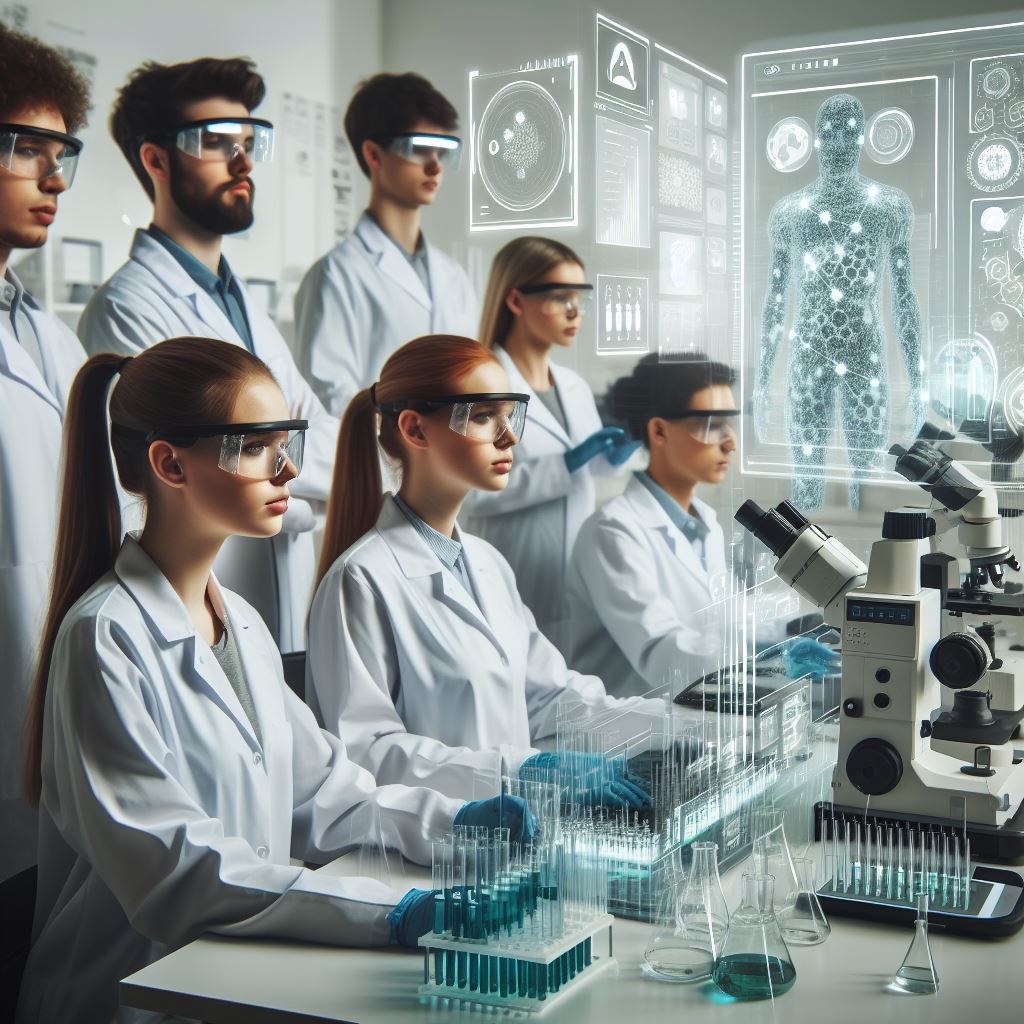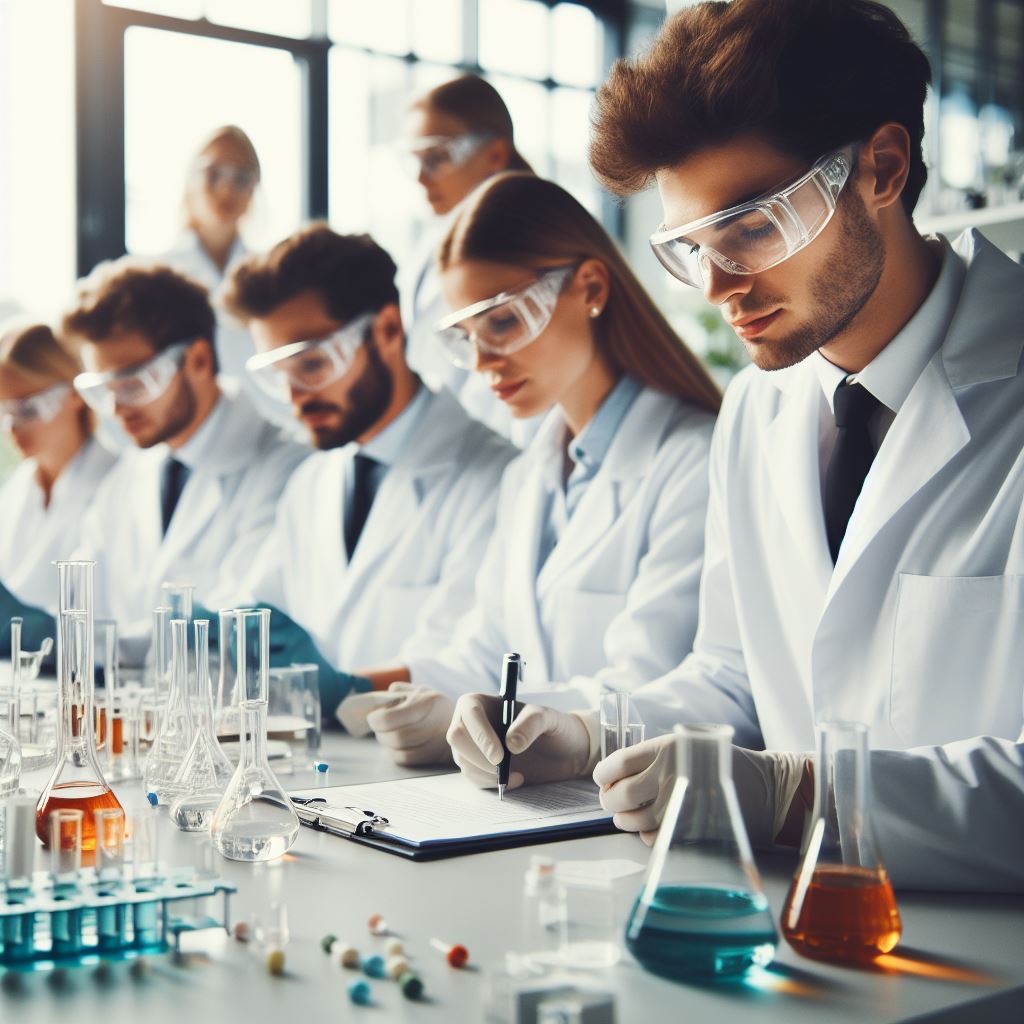Introduction
Lab techs and AI have become an emerging interface, revolutionizing various industries with their growing presence and importance.
Lab technicians and artificial intelligence (AI) are converging to revolutionize scientific research and healthcare.
As technology advances, lab techs increasingly collaborate with AI systems to enhance data analysis, automate repetitive tasks, and accelerate the discovery process.
AI-powered tools facilitate more efficient experiment design, predictive analytics, and precise identification of patterns in complex datasets.
This synergy optimizes workflow, reduces human error, and expedites breakthroughs in fields such as genomics, drug discovery, and diagnostics.
While AI complements the skills of lab technicians, ethical considerations and ongoing training are crucial to ensure responsible and effective integration of these technologies in scientific endeavors.
Artificial Intelligence (AI) is rapidly transforming industries worldwide, playing a pivotal role in enhancing efficiency and innovation.
From healthcare and finance to manufacturing and retail, AI is revolutionizing processes through automation, predictive analytics, and intelligent decision-making.
In healthcare, AI aids in diagnostics and drug discovery, while in finance, it optimizes trading and risk management.
Manufacturing benefits from AI-driven automation, improving production efficiency. Retail leverages AI for personalized customer experiences and supply chain optimization.
As AI continues to evolve, its integration into diverse sectors highlights its growing importance in shaping the future of technology-driven industries.
Overview of Lab Techs
When it comes to the healthcare industry, lab techs play a crucial role.
Lab techs are professionals who perform various tasks related to laboratory testing and analysis.
They are responsible for conducting experiments, analyzing samples, and assisting with research projects.
Lab techs use sophisticated equipment and techniques to ensure accurate results.
They work under the supervision of scientists and researchers, helping them gather data and draw conclusions.
Lab techs are essential for maintaining the quality and integrity of research projects.
They follow strict protocols and procedures to ensure that experiments are conducted properly.
Lab techs handle a wide range of samples, including blood, urine, tissue, and body fluids.
They perform tests to diagnose diseases, monitor treatments, and detect abnormalities.
Lab techs are trained to use automated systems and computer software to analyze samples.
They interpret the results and communicate them to healthcare professionals for further action.
Lab techs also play a crucial role in maintaining laboratory equipment and supplies.
They ensure that all instruments are calibrated and functioning properly.
Lab techs are responsible for storing and handling hazardous materials safely.
Unlock Your Career Potential
Visualize a clear path to success with our tailored Career Consulting service. Personalized insights in just 1-3 days.
Get StartedThey adhere to strict safety protocols to prevent accidents and protect themselves and others.
Lab techs work in a collaborative environment, often coordinating with other healthcare professionals.
They provide support to doctors, nurses, and researchers, assisting them in their work.
Lab techs are often involved in research projects, helping to design experiments and collect data.
They contribute to the advancement of medical knowledge and the development of new treatments.
Importance of lab techs in conducting experiments, analyzing samples, and assisting with research
Lab techs are essential for the smooth operation of healthcare facilities.
They play a key role in diagnosing and monitoring diseases, leading to effective treatments.
Lab techs work in various healthcare settings, including hospitals, clinics, and research laboratories.
They must stay updated with the latest techniques and technologies in their field.
Lab techs undergo continuous training to enhance their skills and knowledge.
They participate in professional development programs to stay informed about advancements in their field.
Lab techs are in high demand in the healthcare industry.
The field of laboratory technology is projected to grow rapidly in the coming years.
Job opportunities for lab techs are expected to increase, offering stability and career growth.
Lab techs are an indispensable part of the healthcare industry.
They play a crucial role in conducting experiments, analyzing samples, and assisting with research.
Lab techs ensure accurate results, contribute to medical advancements, and support other healthcare professionals.
Their expertise and dedication make them vital for the smooth functioning of healthcare facilities.
Introduction to AI
In the modern era, Artificial Intelligence (AI) has become a buzzword that encompasses a range of technologies.
AI refers to the development of computer systems capable of performing tasks that typically require human intelligence.
These tasks may include speech and image recognition, problem-solving, decision-making, and learning.
The concept of AI is not new; its roots can be traced back to the 1950s.
The term “Artificial Intelligence” was coined by John McCarthy in 1956, who defined it as the science and engineering of making intelligent machines. Since then, AI has evolved significantly.
AI has had a profound impact on various sectors, ranging from finance to automotive and from retail to healthcare.
In healthcare, AI has the potential to revolutionize the way medical professionals diagnose and treat diseases.
Impact of AI on different sectors including healthcare
Here are some of the key sectors where AI is making a significant impact:
- Healthcare: AI is being used to augment the capabilities of healthcare professionals in diagnosing diseases, interpreting medical images, analyzing patient data, and providing personalized treatment plans.
- Finance: AI is transforming the finance industry with its ability to analyze vast amounts of financial data, detect patterns, and make predictions. It is used for fraud detection, algorithmic trading, and risk assessment.
- Automotive: AI is driving the development of autonomous vehicles, making them navigate through traffic, detect obstacles, and make real-time decisions to ensure passenger safety. It is also being used for predictive maintenance and optimizing fuel efficiency.
- Retail: AI is being used to enhance the shopping experience by providing personalized recommendations, improving inventory management, optimizing pricing strategies, and predicting customer behavior.
- E-commerce: AI is enabling businesses to understand customer preferences and behavior, improve search results, and enable virtual assistants to enhance the overall shopping experience.
In the healthcare sector, AI has the potential to revolutionize patient care.
It can analyze large amounts of patient data, including medical records, lab results, and genetic information, to identify patterns and predict disease outcomes.
This can help doctors make more accurate diagnoses and develop personalized treatment plans.
AI can also help reduce medical errors and improve patient safety by analyzing data from various sources in real time.
For example, AI-powered systems can monitor patients’ vital signs and alert healthcare professionals if there are any abnormalities or signs of deterioration.
This can help prevent adverse events and enable early intervention.
Furthermore, AI can improve the efficiency of healthcare systems by automating administrative tasks, such as scheduling appointments and managing medical records.
This frees up time for healthcare professionals to focus on patient care and reduces the risk of errors.
Challenges and concerns of AI
Despite the numerous benefits of AI in healthcare, there are also challenges and concerns. Privacy and security issues need to be addressed to ensure the confidentiality and integrity of patient data.
Ethical considerations, such as ensuring the responsible use of AI and ensuring transparency in decision-making algorithms, are also crucial.
In essence, AI has the potential to revolutionize various sectors, including healthcare. Its ability to analyze large amounts of data, make predictions, and automate tasks can augment the capabilities of healthcare professionals and improve patient care.
However, it is important to address the ethical and privacy concerns associated with the use of AI to ensure its responsible and beneficial implementation.
The intersection of lab techs and AI
In recent years, the integration of artificial intelligence (AI) with the duties of lab technicians has become an emerging interface in various scientific fields.
This marriage of human expertise and technological advancements has the potential to revolutionize lab processes and yield numerous benefits.
Potential benefits and challenges of integrating AI in lab tech duties
One of the key advantages of integrating AI in lab tech duties is the enhanced efficiency it brings.
AI algorithms can streamline data collection, analysis, and interpretation, enabling lab techs to focus on higher-level tasks.
By automating routine and time-consuming processes, AI allows technicians to allocate their time and energy to more complex and intellectually stimulating activities.
How AI can enhance efficiency and accuracy in lab processes
In addition to efficiency, AI also has the potential to improve accuracy in lab processes. Machines are capable of performing repetitive tasks with consistent precision, minimizing the risk of human errors.
For example, AI-powered instruments can precisely measure, analyze, and report data, reducing variability and ensuring reliable results.
This heightened accuracy ultimately contributes to the credibility and reproducibility of scientific experiments, leading to better research outcomes.
Concerns or fears related to the displacement of lab techs by AI
However, integrating AI in lab tech duties also poses challenges and concerns. One significant worry is the potential displacement of lab technicians by AI.
As AI technology progresses, there is a fear that machines might replace human workers completely.
This concern raises questions about job security and the need for retraining or upskilling lab techs to adapt to the changing landscape.
The importance of human skills and expertise alongside AI technologies
Despite these concerns, it is crucial to recognize that AI is not meant to replace lab technicians, but to assist and complement their skills.
Human expertise is still invaluable in decision-making, experimental design, troubleshooting, and adapting to unexpected situations.
While AI can automate processes, it lacks the critical thinking, creativity, and intuition that humans bring to the table. Therefore, it is essential to value and nurture these human skills alongside AI technologies.
Lab techs, armed with their knowledge, experience, and critical thinking abilities, play a vital role in ensuring the accuracy and integrity of scientific experiments.
Their human touch and understanding of context are indispensable in interpreting complex results or identifying anomalies that AI algorithms might overlook.
Moreover, lab techs possess the ability to apply ethical considerations and judgment, which are crucial in research environments.
In fact , the intersection of lab techs and AI brings both potential benefits and challenges.
Integrating AI in lab tech duties can enhance efficiency and accuracy in processes, but concerns regarding job displacement exist.
It is essential to strike a balance between AI and human skills, recognizing the unique strengths each brings to the table.
By doing so, the scientific community can harness the power of AI while preserving the expertise, creativity, and judgment of lab techs.
Read: Day in the Life of a Canadian Research Chemist

AI Tools and Techniques in Lab Tech Work
Artificial Intelligence (AI) has revolutionized various industries, and lab tech work is no exception.
With the emergence of AI in this field, lab technicians can now benefit from enhanced efficiency, accuracy, and productivity.
Specific AI tools and techniques already being used in lab tech work
Let’s explore some specific AI tools and techniques that are already being used in lab tech work.
1. Machine Learning Algorithms
Machine learning algorithms play a crucial role in lab tech work by assisting in data analysis, sample processing, and experiment planning.
These algorithms can quickly analyze large volumes of data and identify patterns that may be difficult or time-consuming for humans to detect.
Lab techs can use machine learning algorithms to analyze complex datasets and derive valuable insights. It helps in streamlining lab processes, reducing human errors, and achieving more accurate results.
2. Robotics and Automation
Lab tech work often involves repetitive tasks, which can be tedious and prone to errors.
AI-powered robots and automation tools are being introduced in laboratories to assist lab technicians in sample processing and handling.
These robots can prepare samples, handle delicate equipment, and perform various laboratory processes with precision and accuracy.
They can also work continuously without fatigue, ensuring consistent and reliable results.
3. Virtual Assistants and Chatbots
Virtual assistants and chatbots are becoming increasingly popular in lab tech work for providing instant support and guidance.
Lab technicians can rely on these AI-powered tools to assist in experiment planning, procedure execution, and troubleshooting.
Virtual assistants can answer queries, provide step-by-step instructions, and even offer personalized recommendations based on previous experiments or data analysis.
This not only saves time but also enhances the overall efficiency of lab operations.
Successful Implementation of AI in Lab Tech Roles
Several examples demonstrate the successful implementation of AI in lab tech roles, showcasing its effectiveness and potential for further advancements.
1. Drug Discovery and Development
In the pharmaceutical industry, AI has significantly expedited the process of drug discovery and development.
Machine learning algorithms can analyze vast databases of chemical compounds, predict their properties, and even suggest potential drug candidates.
This saves considerable time and resources that would otherwise be spent on manual experimentation and reduces the risk of failure at later stages of drug development.
2. Diagnostics and Medical Imaging
AI has made remarkable strides in diagnostics and medical imaging interpretation.
Deep learning algorithms can analyze medical images such as X-rays, CT scans, and MRI scans to detect abnormalities and assist in accurate diagnosis.
These AI tools can identify patterns and generate insights that may not be immediately apparent to human observers.
This ensures early detection, improved treatment planning, and enhanced patient care.
3. Quality Control and Lab Safety
AI tools have also been implemented in quality control and lab safety procedures.
Machine learning algorithms can monitor and analyze various parameters, such as temperature, pressure, and chemical concentrations, in real-time.
In case of any anomalies or deviations from expected values, these AI systems can trigger alerts, helping lab technicians identify and resolve issues promptly.
This reduces the risk of errors, ensures compliance with safety standards, and maintains high-quality standards in lab operations.
Basically, AI tools and techniques have significantly enhanced lab tech work by improving data analysis, sample processing, and experiment planning.
Successful implementation of AI in various lab tech roles highlights its immense potential in revolutionizing the field.
As technology continues to advance, AI is likely to play an increasingly vital role in the future of lab tech work.
Read: Chemistry Careers: Scope in Canada’s Industries
Gain More Insights: The Role of Data Science in Canadian Healthcare
Training and Education of Lab Techs for AI Integration
Lab technicians play a critical role in the healthcare industry, conducting various tests and experiments to assist in diagnosing and treating diseases.
However, with the rapid advancements in technology, it has become crucial for lab techs to update their skills and knowledge to effectively integrate artificial intelligence (AI) into their work process.
The need for lab techs to update their skills to work collaboratively with AI
As AI technology continues to evolve, it has the potential to revolutionize the field of laboratory science.
Lab techs must adapt and update their skills to effectively collaborate with AI systems and harness their full potential.
AI algorithms can assist lab techs in analyzing complex data sets, identifying patterns, and making accurate predictions.
However, to work collaboratively with AI, lab techs must understand the underlying principles of AI technology and be able to interpret and validate the results generated by AI systems.
As AI becomes more integrated into laboratory workflows, lab techs will be required to interact with AI-powered instruments and software.
They must possess the necessary skills to operate and troubleshoot these advanced technologies, ensuring accurate results and optimal efficiency in laboratory processes.
The importance of ongoing training and education to keep up with technological advancements
Ongoing training and education are crucial for lab techs to keep up with the latest technological advancements and effectively integrate AI into their work.
The healthcare industry is constantly evolving, and lab techs must stay updated to deliver the highest quality of patient care.
By participating in continuing education programs, lab techs can stay informed about the latest AI applications and advancements relevant to their field.
This knowledge enables them to adapt their skills and stay ahead in an ever-changing healthcare landscape.
Ongoing training also equips lab techs with the necessary expertise to overcome any potential challenges associated with AI integration.
They can learn about the limitations of AI systems, potential biases, and ethical considerations in using AI technology, ensuring responsible and informed decision-making.
Available resources and programs for lab techs to learn about AI applications
A variety of resources and programs are available to help lab techs learn about AI applications and develop the necessary skills.
Professional organizations, such as the American Society for Clinical Laboratory Science and the American Association for Clinical Chemistry, provide access to webinars, conferences, and workshops focused on AI integration in laboratory settings.
Online platforms and e-learning courses, like Coursera and edX, offer specialized courses on AI and machine learning, tailored to the needs of lab techs.
These courses cover topics such as AI algorithms, data analysis, and validation techniques.
In addition, collaboration between academic institutions and industry partners can provide lab techs with opportunities for hands-on training with AI-powered instruments and software.
Continuous learning and development are essential for lab techs to adapt to the evolving landscape of AI technology.
By updating their skills and embracing AI integration, lab techs can enhance their efficiency and accuracy, ultimately improving patient care outcomes.
Generally, the collaboration between lab techs and AI systems holds immense potential for the healthcare industry.
Lab techs must actively update their skills through ongoing training and education to effectively integrate AI into their work processes.
By leveraging available resources and programs, lab techs can learn about AI applications and become valuable contributors in advancing patient care through AI technology.
Read: Canadian Chemists and COVID-19: Pioneering Work
Ethical Considerations in Lab Techs and AI
As AI technology becomes more prevalent in laboratory settings, it is crucial to address the ethical concerns that arise from its use.
AI has the potential to greatly enhance lab tech duties by automating tasks and analyzing data more efficiently.
However, there are several ethical considerations that need to be carefully examined and addressed.
Ethical Concerns Related to AI Use in Lab Tech Duties
One of the primary concerns when integrating AI into lab tech duties is data privacy. Lab techs often handle sensitive and confidential information, including patient data and research findings.
It is essential to ensure that AI systems have robust security measures in place to protect this information.
Bias is another significant ethical concern associated with AI. Many AI algorithms are trained on historical data, which may contain biases.
If these biases are not identified and mitigated, they can lead to discriminatory outcomes. It is crucial for lab techs to be aware of this issue and work towards eliminating biases in AI systems.
Transparency is also a key consideration in AI integration. Lab techs should have a clear understanding of how AI algorithms arrive at their decisions.
The “black box” nature of some AI systems can lead to distrust and uncertainty. Transparent AI systems can help lab techs gain confidence in the technology and ensure its responsible use.
Establishing Guidelines and Regulations for Responsible AI Integration
To address these ethical concerns, it is vital to establish guidelines and regulations for the responsible integration of AI in lab tech duties.
These guidelines should prioritize data privacy, ensuring that sensitive information is protected at all times.
Moreover, guidelines must emphasize the need for thorough data analysis to identify and rectify biases in AI algorithms.
Lab techs should be equipped with the necessary skills to critically evaluate AI outputs and intervene if discriminatory patterns emerge.
Transparency can be encouraged by ensuring that AI systems provide explanations for their decisions.
This can be achieved through the use of interpretable AI models or by developing auditing mechanisms that allow lab techs to understand the rationale behind AI-generated results.
Furthermore, setting up regulatory bodies and expert committees can help oversee the ethical implementation of AI in laboratory settings.
These bodies can develop and enforce guidelines, conduct regular audits, and ensure compliance with ethical standards.
The Importance of Ethical Considerations in Lab Techs and AI
Ethical considerations play a crucial role in the successful integration of AI into lab tech duties.
By addressing data privacy, bias, and transparency concerns, lab techs can harness the power of AI while minimizing potential harms.
Responsible AI integration not only protects sensitive information but also ensures fair and unbiased outcomes.
It promotes trust in AI systems and encourages wider adoption and acceptance of this technology in laboratory settings.
Ultimately, by establishing guidelines and regulations, lab techs can navigate the ethical complexities of AI and maximize its potential to revolutionize their work, leading to advancements in healthcare, research, and scientific discovery.
Read: Top Canadian Chemists: Their Path and Impact
Conclusion
Lab techs play a crucial role in the age of AI, as their responsibilities evolve alongside new technological advancements.
The integration of AI offers numerous benefits, such as increased efficiency and accuracy in data analysis.
However, it is important to acknowledge potential challenges, including job displacement and the need for continuous education.
Despite these challenges, the possibilities for AI applications in the lab tech field are vast and should be further explored.
By embracing and adapting to AI, lab techs can revolutionize their roles and contribute to groundbreaking discoveries in scientific research.
It is an exciting time for the lab tech community, and a willingness to embrace AI will be key to their continued success and relevance.




